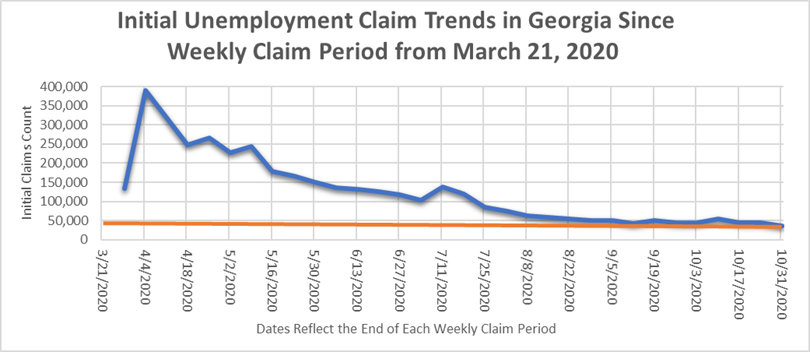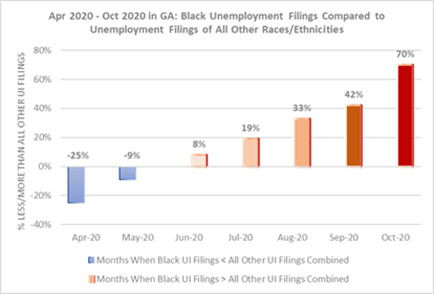The runoff elections for U.S. Senate in Georgia on January 5, 2021 will determine control of the Senate and affect national policy across a wide range of areas. This fact sheet provides an overview of the likely impact of the Senate races on two key worker issues: access to unemployment benefits during the pandemic-induced recession, and raising the federal minimum wage from its current level of $7.25 per hour. The fact sheet presents data from the Century Foundation and the Economic Policy Institute on the impact on Georgia workers of senators’ policy positions on these issues.
If Senator David Perdue and Senator Kelly Loeffler are elected in January, pandemic unemployment insurance benefits are likely to be restored only to a very limited degree, if it all—and the federal minimum wage is likely to remain frozen at $7.25 per hour, as it has been since 2009. But if Raphael Warnock and Jon Ossoff are elected to the Senate, jobless Georgians are likely to see unemployment benefits restored and extended for more of the pandemic-induced recession. And Georgia workers will be far more likely to see the federal minimum wage increased and gradually phased up to $15 an hour—the first increase in 11 years. The public should find out more about these and other issues critical to Georgians and ask the candidates to discuss their positions to better understand where they stand.
Unemployment Insurance
- Georgia and the entire country remain in one of the worst unemployment crises in modern U.S. history. Even as Georgia’s economy began to reopen this fall, the COVID-19 pandemic and resulting recession are continuing to cause as many or more Georgians to lose their jobs each month as we saw during the worst weeks of the Great Recession. See Figure 1 – in which the upper blue line shows weekly new unemployment claims in Georgia this year, while the lower orange line shows the level in Georgia at the peak of the Great Recession.
| Figure 1 |
 |
| Source: Century Foundation analysis |
- As the pandemic swept the nation in the spring, Congress approved expanded unemployment insurance (UI) benefits in the CARES Act—including an extra $600 per week to ensure that unemployed Georgians could actually pay their bills, since state UI benefits in Georgia and most of the country are very low.
- When the $600 per week UI supplement expired in July, Senator Kelly Loeffler and Senator David Perdue sided with Senate Majority Leader Mitch McConnell in refusing to extend it, causing UI benefits in Georgia to plummet to just $254 a week for the average unemployed worker—not nearly enough to allow those out of work to pay their bills and put food on the table.
- Now, even those lower benefits are scheduled to end for many unemployed workers the day after Christmas. The Century Foundation projects that more than 330,000 Georgians will be cut off from this safety net and fall off a financial cliff, unless Congress acts to extend unemployment assistance. That figure includes nearly 147,000 Georgians receiving Pandemic Unemployment Assistance (PUA), which provides assistance to workers who are otherwise shut out of state unemployment benefits, such as gig workers, self-employed persons, church workers, and many part-time workers. It also includes more than 183,000 Georgians receiving Pandemic Extended Unemployment Compensation (PEUC), which provides 13 weeks of extended unemployment benefits for workers whose weeks of other jobless aid has run out. See Figure 2.
- These are conservative projections and could end up being significantly worse for two reasons. First, Georgia’s PUA enrollment alone has remained nearly unchanged for the last three months, with net enrollment hovering at over 200,000. This indicates that employment prospects for gig workers, self-employed persons, church workers, and part-time workers—who are often underemployed—have not improved much at all recently. These working Georgians face a December 26 cutoff from possibly the only income they have left. Second, Georgia’s Department of Labor has yet to release all of its data on PEUC enrollment. Therefore, enrollment may be larger than projected.
| Figure 2 | |
| Georgia Workers Facing Loss of CARES Act Unemployment Benefits on Dec. 26 | |
| Workers on PEUC | 183,648 |
| Workers on PUA | 146,674 |
| Total | 330,322 |
| Source: Century Foundation analysis | |
- By putting money in the pockets of 330,000 jobless Georgians to spend on necessities at local businesses, extending unemployment benefits would also stimulate Georgia’s economy and thereby preserve and create jobs in the state, offsetting some of the past year’s losses. The Economic Policy Institute estimates that extending the PUA and PUEC programs until the end of 2021 and restoring the $600 weekly supplement would boost the national economy by 3.5% and create or save 5.1 million jobs across the country—including 144,000 in Georgia.
- In the past, Mitch McConnell, with the support of Senator Kelly Loeffler and Senator David Perdue, has called for restoring a lower $200 per week unemployment supplement, although they have refused to bring such a package to a vote or pass it.
- But now with 330,000 Georgians just weeks away from losing their CARES Act unemployment benefits, McConnell’s latest proposal includes no unemployment supplement at all, and would extend benefits for the 330,000 Georgians for just one month through the end of January with an explicit phase out—despite the fact that we have months and months of pandemic and recession still ahead of us.
- Senators Perdue and Loeffler have been silent about the 330,000 Georgians now facing loss of their CARES Act unemployment benefits on December 26.
- It is true that some of the unemployed Georgians losing their PEUC CARES Act benefits will be eligible for continued unemployment benefits under Georgia’s State Extended Benefits (EB) program. But EB is a poor substitute for PEUC because of its very restrictive eligibility rules. Only 600,000 jobless workers are on the program nationwide, and it has a number of roadblocks including a rule that excludes unemployed workers who were eligible for regular UI and PEUC, but who worked fewer than 20 weeks before losing their job.
- Moreover, Georgia must pay the cost of EB benefits for as many as 13 weeks— not the federal government. Senators Perdue and Loeffler appear ready to saddle the state with the heavy cost of paying for those benefits.
- Senate candidates Reverend Raphael Warnock and Jon Ossoff have both called for extending unemployment benefits and restoring the $600 per week supplement. A Democratic majority in the Senate would be expected to act quickly to approve further pandemic relief, including restoring and extending unemployment benefits.
- Perdue and Loeffler’s opposition to restoring the $600 per week unemployment supplement and silence about the 330,000 Georgians about to lose CARES Act unemployment benefits come as the pandemic-induced unemployment crisis is hitting Black Georgians much harder than whites. During the pandemic, Black workers have been significantly overrepresented among Georgians losing their jobs and filing for unemployment. In the latest data from October, Black workers made up 63% of workers newly losing their jobs, while they represent just 31% of Georgia’s workforce. And the number of Black workers filing unemployment claims is now 70% higher than that for all other workers combined. See Figure 3.
| Figure 3 |
 |
| Source: Century Foundation analysis |
- This stark skew is indicative of persistent impediments that Black workers face in the labor market—including employment discrimination, unequal pay, and occupational segregation in industries hardest hit by the pandemic, such as hospitality, tourism, entertainment, and other service sectors. These longstanding impediments are the reason that unemployment and underemployment among Black workers and other workers of color has often been double that of their white counterparts for decades.
Minimum Wage
- Because Mitch McConnell’s Senate majority—with the support of Senator Perdue and Senator Loeffler—has also been blocking all efforts to raise the minimum wage, it has been frozen since 2009, the longest period ever without a minimum wage increase since the federal minimum wage was enacted in 1938. At just $7.25 an hour, the value of the federal minimum wage today in inflation-adjusted dollars is lower than it was in the early 1960s.
- Raising the federal minimum wage to $15 an hour by 2025 would deliver long overdue raises for 1.5 million working Georgians, according to Economic Policy Institute estimates. Thirty-five percent of the state’s workforce would receive a big raise averaging $4,200 per year—and an even larger share of Black and Latinx Georgians would see raises. As a result, raising the minimum wage to $15 an hour would significantly reduce the racial wage gap.
- Raising Georgia workers’ pay to $15 an hour by 2025 would also save taxpayers billions each year, as fewer Georgians would be forced to rely on taxpayer-funded programs such as Medicaid and SNAP food assistance. According to the Government Accountability Office, currently 189,000 working Georgians are enrolled in Medicaid, and 143,000 receive SNAP food assistance. The largest numbers of these employees work for large corporations like Walmart, McDonalds, and Dollar General that pay very low wages.
- Senator Perdue, a former CEO of Dollar General, which has a track record of lawsuits alleging violations of minimum wage laws, opposes raising the minimum wage. Senator Loeffler has been silent on the issue.
- If Senators Perdue and Loeffler are elected on January 5th and Mitch McConnell remains Senate Majority Leader, the federal minimum wage is likely to remain frozen at $7.25 per hour. During his six years as majority leader, McConnell has consistently blocked any minimum wage increase from being considered or passed by the Senate.
- Raphael Warnock and Jon Ossoff have both called for raising the minimum wage. A Democratic majority in the Senate would likely act quickly to raise the federal minimum wage to $15 per hour, as the U.S. House of Representatives voted to do in 2019, and as Senate Democrats tried to do throughout the 2019-20 session—but were blocked by McConnell, with Perdue and Loeffler’s support.
- The U.S. Chamber of Commerce, one of the top corporate lobby groups opposed to raising the minimum wage, is spending millions to ensure that Senators Perdue and Loeffler keep their seats—so they and Mitch McConnell can continue blocking efforts to raise the minimum wage.


